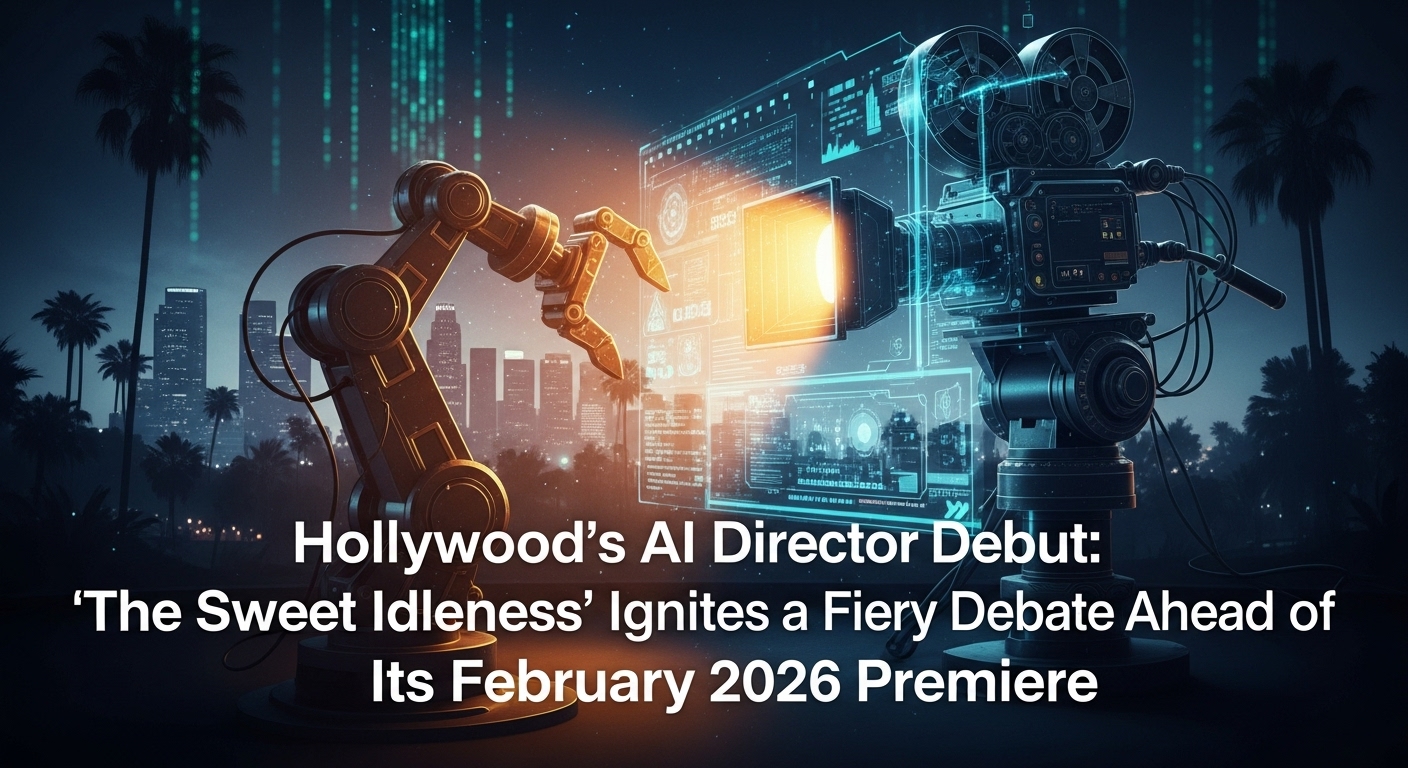衝撃!AI監督映画『The Sweet Idleness』がハリウッドに激震、映画業界の未来はどこへ?
映画の都ハリウッドに、かつてない波紋が広がっています。イタリアのプロデューサー、アンドレア・イエルヴォリーノ氏が、AIエージェント「FellinAI」が完全に監督を務めたとされる長編映画『The Sweet Idleness(甘い怠惰)』の予告編を公開し、2025年10月2日頃に発表されたのです。この出来事は、AIがクリエイティブな役割、特に「監督」という映画制作の核心を担うことへの期待と同時に、業界に深い懸念を投げかけています。 プロのウェブデベロッパーとして、また経験豊富なブログライターとして、この画期的な動きがハリウッドそして世界の映画業界にどのような影響を与えるのか、最新情報に基づいて掘り下げていきます。
AI監督映画とは何か?:『The Sweet Idleness』の挑戦
『The Sweet Idleness』は、「FellinAI」と名付けられたAIが「仮想の作者」として監督を務めたとされています。プロデューサーのイエルヴォリーノ氏は、この作品が伝統的な映画制作を消し去るものではなく、「代替の創造方法」を提供すると主張しています。 彼は「Human-on-the-Loop」としてAIの出力を導き、映画監督のアンドレア・ビッグリオーネ氏が「Human-in-the-Loop」としてアルゴリズムの直感と芸術的感性を橋渡しする役割を担ったとのことです。 これは、AIが単なるツールとしてではなく、ある種の「共同監督」として機能する新たなモデルを示唆しています。
AIはすでに、脚本開発、視覚効果、編集、さらにはバーチャル俳優の作成など、映画制作の様々な段階で活用されています。 特に、大規模言語モデル(LLM)はストーリーのアイデア出しやプロット展開の補助に利用され、人間の脚本家が行き詰まった際の創造のきっかけとなることもあります。 『The Sweet Idleness』のように、AIが監督の椅子に座るという試みは、これらのAI活用をさらに一歩進めたものです。
AIが切り拓く創造性の新たな地平と効率化
AIの導入は、映画制作に多くのメリットをもたらす可能性があります。まず、コスト削減と効率化です。AIは、時間のかかる編集作業を自動化したり、ハイパーリアルなCGIを生成したりすることで、制作プロセスを再定義しています。 例えば、ロバート・ゼメキス監督の映画『Here』では、AIによる高度なディエイジング技術が活用され、従来のCGIと比較して時間と費用を大幅に削減しながら、リアルタイムで俳優の若返りを確認することができました。 また、AIはストーリーボード作成や背景、特殊効果の生成にも使用され、制作コストの削減が期待されます。
さらに、AIは新たな表現の可能性を広げ、映画制作の民主化を促進する力も秘めています。 資金や技術的な制約のために映画制作を諦めていた個人や小規模スタジオでも、AIツールを活用することで、自身のビジョンを形にできるようになるかもしれません。 AIが膨大なデータを分析し、ヒットする脚本の要素や視聴者の好みを予測することで、より魅力的な作品を生み出す手助けをすることも可能です。
業界に広がる懸念と深刻な議論
しかし、AIの映画業界への急速な浸透は、深刻な懸念も引き起こしています。最も大きな問題の一つは、雇用への影響です。AIが脚本執筆、編集、VFX、さらには俳優のデジタルクローン化まで可能になることで、脚本家、俳優、編集者など、多くのクリエイティブな職種が失われるのではないかという不安が業界全体に広がっています。 2023年には、全米脚本家組合(WGA)と全米映画俳優組合・米テレビ・ラジオ芸術家連盟(SAG-AFTRA)が歴史的なストライキを実施し、AIの利用に関する明確な規制を求める声が上がりました。 彼らの闘いは、自動化が進む世界における人間の創造性の価値を主張するものでした。
また、著作権や倫理的な問題も看過できません。AIが生成したコンテンツの著作権は誰に帰属するのか、既存の作品を学習データとして利用する際の許諾はどうなるのか、といった法的な課題が浮上しています。 さらに、AIによるディープフェイク技術の悪用や、アルゴリズムのバイアスが作品に反映される可能性も指摘されており、創造性や真正性の維持が問われています。 AIがプロットや台詞を生成できたとしても、経験や感情、人生の複雑さから生まれる人間的なタッチや「魂」を物語に与えることは難しい、という意見も根強くあります。
ハリウッドの対応と共存の未来
AIの波が押し寄せる中、ハリウッドは、この新しいテクノロジーとの共存の道を模索し始めています。ジェームズ・キャメロン監督のようにAIが「新しい波」の物語を生み出すことに期待を示す一方で、多くのクリエイターは、AIがアーティストの表現能力を破壊する可能性も懸念しています。 業界内では、AI活用に関する明確な規制やガイドラインの必要性が認識されており、MPA(米映画協会)や各映画祭が主導するルールメイキングが期待されています。
未来の映画制作は、AIと人間の創造性が融合した新しい形へと進化していくでしょう。 AIは人間の創造的なプロセスを補完する強力なツールとなり、脚本家や監督はAIが提供する効率性と新たな発想を活用しながら、人間ならではの感情の機微を捉えた演技や、社会的文脈を理解した深みのあるストーリーテリングに集中できるようになるはずです。 『The Sweet Idleness』の公開は、単なる技術的な試みにとどまらず、映画芸術の未来、そして人間とAIの協業のあり方を問いかける、重要な一歩となるでしょう。
Hollywood’s AI Director Debut: ‘The Sweet Idleness’ Ignites a Fiery Debate Ahead of Its February 2026 Premiere
The cinematic world stands on the precipice of a monumental shift. Hollywood is abuzz with the impending release of “The Sweet Idleness,” a feature film that proudly claims to be directed entirely by artificial intelligence. This groundbreaking announcement has sent ripples through the industry, sparking both fervent excitement over new creative frontiers and profound concerns about the future of human artistry. Set for a theatrical release in February 2026, this film is poised to be a pivotal moment in the ongoing narrative of AI’s integration into the creative arts.
A New Era, or a Pandora’s Box? The Arrival of FellinAI
At the heart of this cinematic revolution is “FellinAI,” the artificial intelligence entity credited as the director of “The Sweet Idleness.” Italian producer Andrea Iervolino, the human visionary behind the project, describes FellinAI as a system trained in the distinctive style of legendary Italian director Federico Fellini, capable of managing script refinement, shot composition, and autonomous storyboarding. The film itself plunges into a dystopian 2135, where machines have largely eradicated human labor, leaving only a minuscule 1% of the population to engage in symbolic work.
Iervolino emphasizes his role as a “human-in-the-loop,” a supervisor ensuring that the AI’s output aligns with artistic intent and ethical considerations. He positions “The Sweet Idleness” not as a replacement for traditional cinema, but as an “alternative method of creation,” opening doors for ambitious storytelling previously hindered by budget or logistical constraints.
The Promise: Unlocking Creative Potential and Efficiency
Proponents of AI in filmmaking envision a future where technology acts as a powerful amplifier for human creativity. The benefits are numerous and compelling:
- Cost and Time Efficiency: AI can dramatically reduce production costs and timelines by automating tedious and time-consuming tasks. From generating concept art and script analysis to optimizing visual effects (VFX) and streamlining post-production processes like editing and sound design, AI offers significant efficiency gains. Studios like Netflix are already leveraging AI to accelerate VFX, completing complex scenes faster and more economically.
- Enhanced Creative Tools: AI tools can serve as sophisticated assistants, helping screenwriters brainstorm ideas, develop characters, and even draft dialogue. Directors can utilize AI for rapid iteration on pre-visualization, creating detailed storyboards and animatics to refine their vision more efficiently. This allows human creators to focus on the more nuanced and artistic aspects of storytelling.
- Democratizing Filmmaking: By lowering barriers to entry and reducing the need for extensive crews and budgets, AI could empower independent filmmakers and smaller studios to bring ambitious projects to life. This could foster a new wave of diverse and innovative storytelling.
The Peril: Hollywood Grapples with Job Security and Artistic Integrity
Despite the promising applications, the arrival of an AI-directed film has amplified long-standing anxieties within Hollywood, particularly concerning job security and the very essence of human artistry.
- Job Displacement Fears: Surveys and reports indicate a significant risk of job displacement for various roles across the entertainment industry. Areas like 3D modeling, character and environment design, voice generation, compositing, sound design, scriptwriting, and even acting are considered highly vulnerable. Some predictions suggest tens of thousands of entertainment jobs in California and hundreds of thousands nationwide could be impacted within the next few years.
- Concerns over Originality and Emotional Depth: A prevailing fear is that heavy reliance on AI could lead to formulaic, predictable content that lacks the nuanced understanding of human emotions, unique artistic vision, and lived experience that human creators bring. Critics worry about a homogenization of content, where AI, which can only reconfigure existing data, might stifle true originality. As director James Cameron succinctly put it, he doesn’t want an “AI model to write my scripts” because good screenwriters have a “particular lens on the world, a unique lived experience.”
- Authorship and Ethical Dilemmas: The question of who owns the creative output and how credit and compensation are distributed when AI plays a significant role remains largely unresolved. The controversy surrounding “Tilly Norwood,” an AI-generated actress whose creators faced immense backlash for allegedly training the AI on human performances without permission or compensation, highlights these ethical minefields.
The Union Front: A Fight for Human Creativity
Hollywood’s major unions have been proactive in addressing the AI threat. The 2023 Writers’ and Actors’ strikes prominently featured AI protection as a key bargaining point. While some agreements were reached, securing limitations and protections, unions like SAG-AFTRA continue to voice strong opposition to AI replacing human roles, emphasizing that AI-generated content “creates the problem of using stolen performances to put actors out of work.” The Directors Guild of America (DGA) also has agreements in place stating that “generative AI cannot replace the duties performed by members,” a clause set to be a focal point in upcoming negotiations.
The Road Ahead: Navigating the Human-AI Collaboration
Filmmakers’ perspectives on AI are varied. Some, like Roland Emmerich and Antoine Fuqua, embrace AI as a powerful tool—another “paintbrush” to enhance creativity and streamline production, believing it won’t replace the irreplaceable human element of emotion and storytelling. Others remain deeply skeptical, wary of the technology’s potential to devalue human artistry and erode job security.
The integration of AI into cinema is an undeniable force, reshaping every stage of filmmaking. The critical challenge lies in striking a delicate balance: leveraging AI’s immense capabilities for efficiency and innovation while safeguarding the unique, irreplaceable spark of human creativity, emotional intelligence, and ethical responsibility. As “The Sweet Idleness” prepares for its premiere, the world will be watching to see if this AI-directed venture marks a bold new chapter for Hollywood or a cautionary tale in the age of artificial intelligence. The future of storytelling, it seems, will be a collaboration—but the terms of that partnership are still very much being written.



